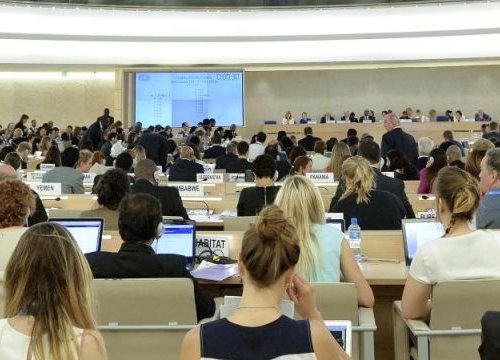Human Rights Mechanisms Must Play a Key Role in the Implementation of the UN Declaration on the Right of Peasants


UN Photo / Jean-Marc Ferre
3 February 2020
The 2018 adoption by the United Nations (UN) General Assembly of the UN Declaration on the rights of peasants and other people working in rural areas (UNDROP) represents a major step towards better protection of the rights of peasants and other people working in rural areas worldwide.
Our new Research Brief discusses the role of human rights mechanisms at national, regional and international levels in monitoring the implementation of the UNDROP. It complements our former Research Brief, which focused on the role of states and international organizations in the implementation of the Declaration.
‘Human rights mechanisms – be it at the national level, regional one or at the UN – must and will play a key role, in the coming years, in protecting the right of peasants and in providing guidance to states on how they can implement the UNDROP. Some of them have already committed to doing so in a joint statement, released on 17 December 2019’ underlines Dr Christophe Golay, Senior Researcher at the Geneva Academy and author of the study.
‘Their contribution will be key as peasants, who represent 70 percent of people living in extreme poverty and 80 percent of the world’s hungry, are too often marginalized within international, regional and national laws and policies’ he adds.
Lessons Learned from the Implementation of the UN Declaration on the Rights of Indigenous Peoples
Making the link with the UN Declaration on the Rights of Indigenous Peoples, the Research Briefs shows the important role of human rights mechanisms in monitoring a similar instrument, as well as the necessity to create specific mechanisms for this purpose.
The Need for New Mechanisms
A major recommendation of this new publication is therefore addressed to the UN Human Rights Council (HRC) and calls for the creation of a new special procedure – a UN special rapporteur or a UN working group – on the rights of peasants and other people working in rural areas.
‘This is the only way to make sure that the protection of the rights of peasants will be a key component of the work of the HRC. The creation of a new special procedure by the HRC would be its most important contribution to the implementation of the UNDROP’ explains Dr Golay.
Similarly, the Research Brief also calls for the establishment of new mechanisms at the regional level, with a Working Group on peasants and other people working in rural areas in Africa and a mandate for a Rapporteur on the rights of peasants and other people working in rural areas in the Americas.
The Roles of National, Regional and International Human Rights Mechanisms
Via a series of recommendations, the Research Brief details what human rights mechanisms – the HRC, the Universal Periodic Review, UN special procedures, UN treaty bodies, as well as regional and national human rights mechanisms – can do to integrate the UNDROP in their work and ensure effective monitoring and implementation of the rights of peasants.
‘In doing so, these mechanisms should pay particular attention to the rights and special needs of peasants and other people working in rural areas who have been historically discriminated against, including older persons, youth, children, persons with disabilities and women. They should also ensure full participation of peasants and meaningful grassroots engagement in human rights systems’ stresses Dr Christophe Golay.








